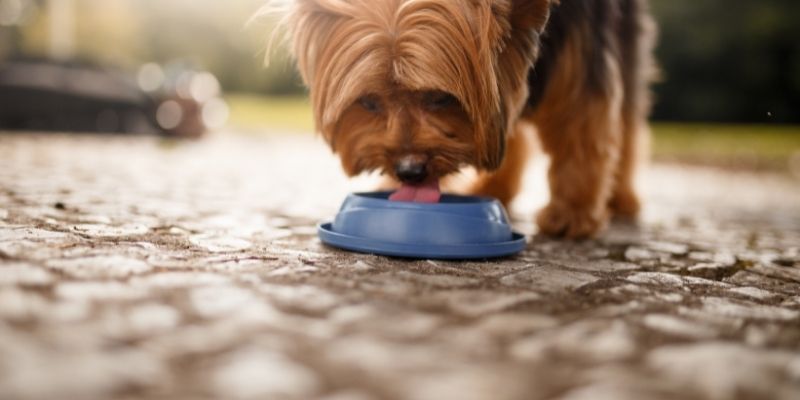Most of the issues that dogs experience cannot be identified quickly, and you may need to consult the veterinarian. So, don’t overlook any abnormal sign as it may indicate that something is wrong with your pet. For instance, you should investigate the possible reason for noticing that your dog is not eating but drinking water.
Do you have a specific question about why dog not eating but drinking water? Then use the table of contents below to jump to the most relevant section. And you can always go back by clicking on the black arrow in the right bottom corner of the page. Also, please note that some of the links in this article may be affiliate links. For more details, check the Disclosure section at the bottom of the page.
Here's what we'll cover:
Why dog stop eating but still drink water? What are the common reasons?
Lack of appetite in dogs can be a sign of a severe problem. Here are some of the reasons why your dog is not eating but drinking water
Sign of illness
One common sign of illness in pets is lack of appetite. However, it doesn’t necessarily have to be a serious issue, as your puppy or dog may have hurt itself when playing. Also, it may be because of severe illnesses such as kidney failure, liver problems, dental disease, and even cancer.
New environments
Unfamiliar territories can cause your dog to lose appetite. So, it might refuse to eat during the first day when you relocate to a new environment or just take a trip. In addition, the dog may be afraid of the place, resulting in stress, nervousness, and anxiety.
Recent vaccination
Vaccinating your pets is highly recommended as it helps to prevent a wide range of diseases. However, vaccines may have some side effects, such as loss of appetite. That is why your dog is not eating but drinking water.
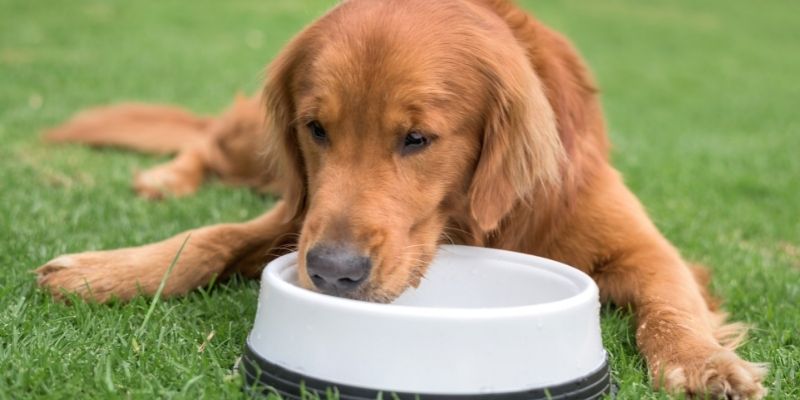
Stomach upsets
Dogs are explorers and will eat anything they come across. For example, your dog can steal your dog and comb the trash whenever it can. This can cause temporary gastrointestinal upset and may be the reason your dog is not eating but drinking a lot of water.
Constipation
Dogs tend to have adnominal pains when constipated, suppressing their appetite. So, consult your veterinarian if you see signs of lethargy, straining to pass stool, and not being playful. Constipation is a common reason why your dog is not eating.
Intimidation
Introducing your dog to another pet might make it feel intimated and react by not eating. Another reason your dog is not eating is because the new pet is a quick eater and finishes everything. Consult your veterinarian if you separate the food bowl and the dog still refuses to eat.
Diet change
Dogs are not picky eaters but may occasionally refuse to eat food they don’t like. For example, your dog can reject new food that smells and tastes different than what it is used to. Also, shifting from wet dog food to kibble may be why your dog is drinking a lot of water but not eating.
What does it mean if an old dog is not eating but drinking water?
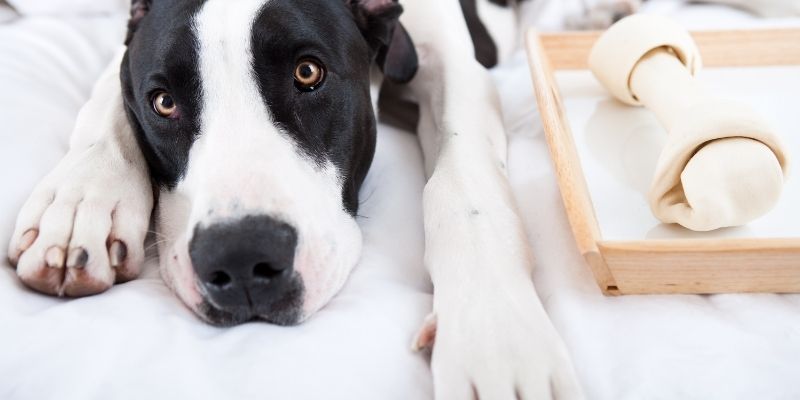
There are many health reasons why your old dog is not eating. Some are minor, while others are severe and can become chronic.
The less severe issues may include food intolerance, depression, cognitive dysfunction, dental disease, digestive system issues, poor smell/taste, etc.
However, your dog may be experiencing more severe health problems such as kidney disease, Addison’s disease, heart problems, or even cancer. Besides appetite loss, your dog may show other symptoms when going through a serious problem. They might include weight gain/loss, lethargy, vomiting, diarrhea, constipation, excessive thirst, panting, etc.
Overall, you should see a veterinarian if your dog is not eating as before or showing any sign of feeling unwell. Although some of the symptoms may not be of concern, you shouldn’t apply a wait-and-see approach with an old dog.
What to do if the puppy is not drinking water but eating
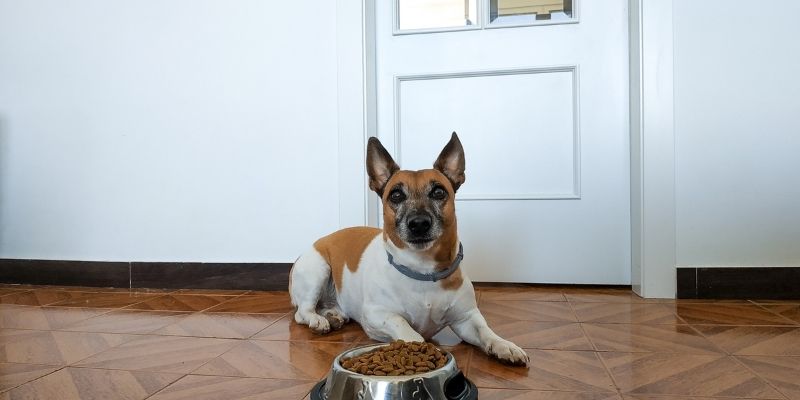
Dogs require adequate water intake every day to avoid dehydration. Small puppies are hydrated by the mother’s milk but need an external water source as they start to wean and eat solid food. Make the water available around the clock to prevent medical problems and keep the pets healthy. So, here are a few tips you can apply if your dog is eating but not drinking water.
Easy access
Try to place several water sources around the house to encourage the dog to drink more water. This will ensure that the dog does not travel long distances to drink water. Also, keep the water bowls clean as debris can discourage the dog from drinking.
Add flavor
Another effective strategy is adding flavor to the water if your dog is eating but not drinking water. Making flavored water for pets is very easy as you can just add a teaspoon of beef or chicken broth.
Dog vomiting after drinking water and not eating. What do I do?
Many reasons can cause a dog to vomit after drinking water. For example, this can happen if it drinks water too fast, especially after an intensive exercise. A one-time occurrence may not cause concern, but the dog might be experiencing health issues if it happens regularly.
Common health conditions include Esophageal dysfunction, bacterial infection, blue-green algae, gastrointestinal blockage, and parasites. The best course of action for most of these issues is taking your dog to the veterinary.
Tips and tricks to make your dog eat
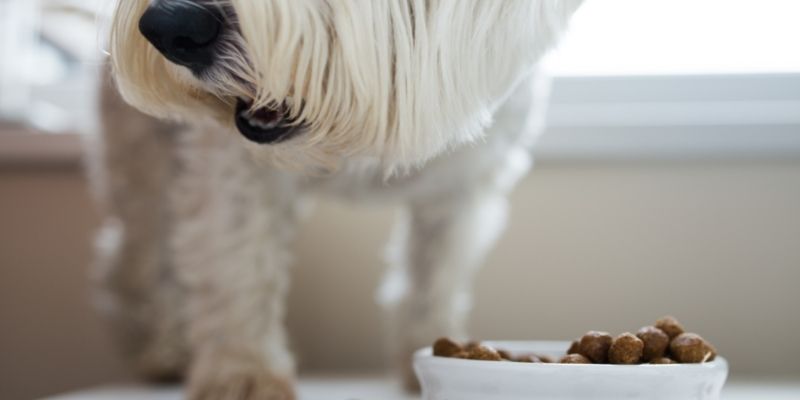
Here are some tips you can use if your dog is not eating but drinking water.
Mix foods
If you introduce something new and your dog refuses to eat, try mixing it with old food. This is a great way to transition to a new diet every time you make a change.
Reduce the treats
The dog might be refusing to eat food because you give it too many treats that fill his stomach. Try to go slow on the treats your dog is relying on to quench hunger.
Thanks for the blog graphics: Canva.com

Thanks for the blog graphics: Canva.com
Doghint.com is a participant of several affiliate programs. The list includes (but not limited to) the following: VigLink, Refersion, ShareASale, and Amazon Services LLC Associates Program, an affiliate advertising program designed to provide a mean for us to earn fees by linking to Amazon.com and affiliated sites. Doghint.com does not intend to provide veterinary advice. All published articles are meant for informational purposes only and not substitute the professional veterinary consultation.

